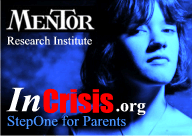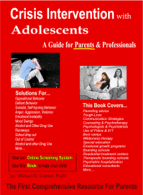By: Michael Conner, Psy.D Summary
Finding a safe, effective and ethical sources of information, treatment and treatment programs for youth at-risk can be a challenge. I have had the opportunity to hear from several thousand professionals and consumers about their experience contacting and placing their child in a program. Not all decided to use a wilderness therapy program. Some chose boot camps. Others did nothing but wait and see what happened next. The most disturbing feedback I have received came from parents who had placed their child in the wrong program for their child. Programs vary a great deal in terms of structure, operation, staff and philosophy. Programs that sound the same can be very different in ways that parents and even other professionals may not understand. Here is a perspective we encourage parents and professionals to consider. Boot Camps. Research has shown that the success rates from boot camp programs are not much better than jail or doing nothing. They are cheaper than jail and that is part of the appeal to law enforcement who are trying to find less expensive alternatives to jail. However, there is a growing concern among professionals that children completing these programs avoid breaking the law for only a few months. Those completing these program may then suffer for traumatic psychological problems that can last a life time. It is rare that you will find a qualified and licensed mental health professional in a program. Licensed mental health professionals can lose their license for condoning abusive practices that take place in many of these programs. Oversight from outside professionals and agencies is minimal and poor. Keep in mind that a boot camp may not be better than the spending the same time in jail. A boot camp may help you child and keep them out of jail or detention, but your child may be safer and receive more services in jail or detention. Be Cautious When Using A Wilderness "Boot" Camp Program. There is an important difference between a wilderness therapy program (emphasis on Therapy) and a wilderness boot (emphasis on Military) camp. Gathering wood to make a fire to stay warm is a responsible behavior and a natural part of living in nature. That is a therapeutic activity that teaches responsibility and the importance of persistent effort in life. These activities represent a natural metaphor to discuss other issues, behaviors and attitudes in the adolescent's life. In contrast, yelling, threatening or striking children who forget to do their chores is not therapy but are punishment and negative reinforcement techniques used in a boot camp. Wilderness boot camps (unlike wilderness therapy programs) are high risk and potentially dangerous options. A wilderness therapy program is very different from a wilderness boot camp. Children with psychological problems such are depression, anxiety, ADHD or substance abuse, and children on medication for psychological or emotional problems should not be enrolled in a boot camp or wilderness boot camp. Never place a child in a boot camp or wilderness boot camp (emphasis on boot) without the involvement of an educational consultant who is also a licensed mental health professional. Even then you are taking a greater risk than may be warranted. Be Careful If You Try To Find A Program Yourself. Programs vary a great deal. Children and especially intervention and follow-up problems can vary tremendously. The values of parents will vary as well. Finding a match between a child, a program and the parent's values is not easy. There is no single program that is best for any child and family. Ask for the qualifications of the people you speak with at a program. Some staff in programs refer to themselves as counselors and therapists and "Dr. so-and-so". In fact they may have a PhD in English literature and no counseling or therapy qualifications. Some staff simply pull titles out of the air and refer to themselves as "Colonel", a "Director" or "Counselor". Many programs get referrals from educational consultants who help parents find the best program. The admission staff in most programs are not nearly as qualified to screen, assess and place your child as a qualified educational consultant. The staff in some programs are trained heavily in sales and marketing, may have no experience working in the programs, can be working out of their homes in other states, and they may have no training or experience to work with children like yours. Be cautious if you are relying on a professional who is affiliated with a program. Be Skeptical Of Parent Recommendations. Virtually every program can give you a list of parents and students who can tell you that the program helped. The question is not, "Do some children benefit?" The question is not, "Do a few parents feel the program acted professionally?" It is very important to know what happened to the children and parents who are not recommending the program. It is entirely possible for individual parents or a group of parents to take legal action against a program from abuse, neglect and over charges, while other parents are entirely loyal because their child benefited. Only a few programs provide highly unreliable services. Some programs could change dramatically if one key staff person left. Parents who recommend a program may not know about and may not tell you about the serious problems and risks in that program. An dangerous program can help a lot of children, but that doesn't make it safe. It is not necessary to risk a child's well-being or life to "save" them. There is no such thing as an "acceptable window of loss" - a term used by an over zealous program owner that is now forced to operate his program outside US territory. Some parents are very loyal to an unsafe program because it helped their child even though other children may have been abused, injured or even died. Programs with serious problems are those that are under funded, poorly staffed, have high staff turnovers, use deceptive marketing practices, over charge parents, have been sued by parents, or they have seriously injured children. Keep in mind that a program that has injured and allegedly caused the death of a child may not be forthright and honest about these tragedies with parents. Qualified educational consultants will usually know what happened. Avoid Programs Based On Punishment, Restraint and The Use of Force. Boot camps, wilderness boot camps and therapeutic boarding programs are very different. The wilderness by itself has a powerful influence. Removing children from an unhealthy environment and placing them in a challenging and therapeutic community is a powerful intervention. Some programs and parents mistakenly believe that punishment through depravation, humiliation, physical exercise and even striking children will be necessary to turn a child around, teach respect or cause them the think more about others. In fact, the use of punishment and force fosters rapid compliance in behavior through a climate of coercion where children face the prospect of punishment, humiliation, injury, pain, as well the loss of freedom or relationship. Profit motives and lack of funding within programs increase the risk that force and punishment are used to gain more rapid results. Such practices can become tantamount to risking the lives and long term well being of children for profit. Abuse does change behavior quickly but it never lasts and it usually teaches children to solve their problems in the same manner. A true wilderness therapy treatment program is not based on punishment, abuse and the use of force. It may take longer if you don't force or abuse children, but abusive punishment in a remote wilderness setting is a potentially dangerous, unethical and immoral short cut. Don't Rely On Advertising To Make Your Decision. Get professional guidance that is not affiliated with a program, or at least educate yourself. Thoroughly research a program. Ask the difficult questions. Get all promises in writing. Ask for a copy or summary of the program's policy and procedures regarding safety, emergencies, discipline, and supervision of students. Few programs provide parents with a summary of their policy and procedures. Not all those that do will follow them. Program web sites can be very informative and they can be very misleading (or outright dishonest). There is no way that you can tell whether or not a program is misleading or outright lying to you based on their web site. Regulation and licensure of programs does not provide parents and professionals with the assurances they need. Programs can help most children. The key is to find a program that is most appropriate for your child and will have a lasting benefit. Fortunately there are only a few programs that are unethical, deceptive, misleading and potentially dangerous.
Copyright 2000 to 2011, Michael G. Conner |


